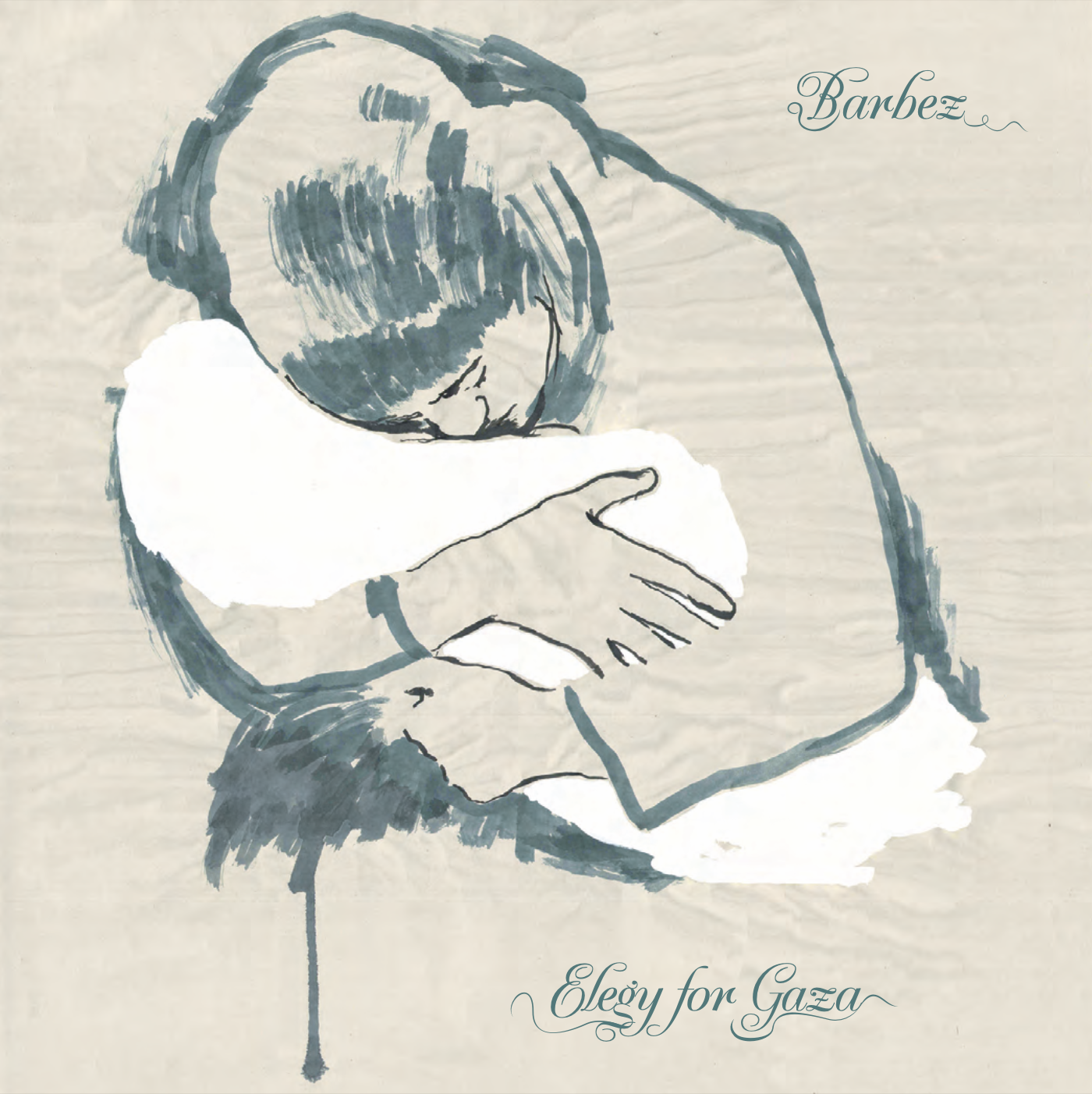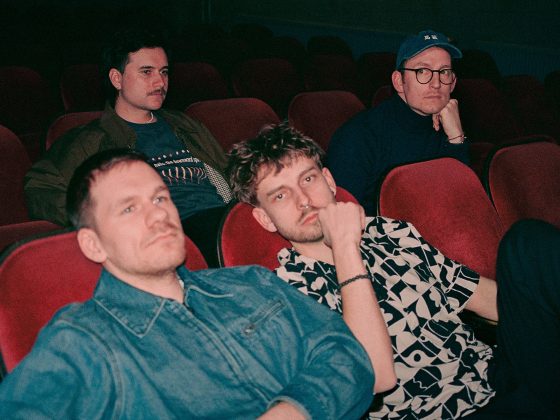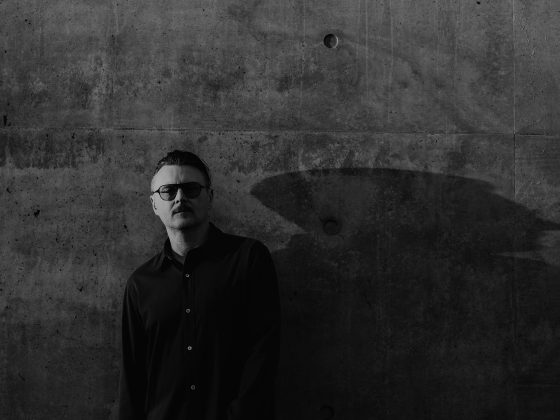Elegy for Gaza, Barbez’s first dispatch in seven years, arrives less as an album and more as a dirge drawn in sorrow, bowed strings, and broken prayer. New York’s avant alchemists return with a lament that sears and sighs, fusing old-world cabaret, Balkan balladry, and chamber cacophony into a ritual of remembrance. Theremin conjuror Pamelia Kurstin and clarinet conjurer Peter Hess join Dan Kaufman’s spectral guitar, Danny Tunick’s haunted marimba, Sarah Bernstein’s sinewed violin, and a rhythm section pulsing with dirge and defiance.
At its core, an Arabic poem, translated by Nana Asfour, a journalist and sister to the composer – gives voice to lives crushed beneath conflict. Artwork comes blessed by Said Khatib, whose lens captured the devastation; reimagined by Adam O’Neal and inscribed with Gabi Asfour’s calligraphy, it becomes relic and rallying cry alike. Barbez does not document the destruction; it keens through it, a cracked chorus for Gaza’s ghosted generation.
“Our music has often drawn inspiration from historical events, struggles for human rights, and poetry,” said the group’s primary songwriter, Dan Kaufman. “All these elements are woven together in this piece. We see this music as a small gesture of solidarity for the citizens of Gaza, especially for its children.”
Proceeds from the recording, out now via Avant Night Records, will benefit World Central Kitchen and the Palestinian Children’s Relief Fund. You can purchase the album here.
Rooftops of Tehran, the elegiac B side, reaches across borders and years to echo a different defiance. It calls back to 2009, when the Green Movement gripped Iran and the sky above Tehran pulsed with protest. A young woman’s voice, raw, real, recorded on a phone, opens the piece, a whispered hope that the rooftop cries of Allahu Akbar would carry on past dusk, past doubt, past the crackdown.
Those chants, once weaponised in revolution, were reclaimed by resistance; an airborne broadcast that tyranny had failed to silence. Barbez channels this nocturnal chorus into sound as signal; a relay of voices raised when streets were barred, of grief turned into grit. It’s not nostalgia, but a night still echoing, replayed in minor keys and mournful measures, reminding us that protest doesn’t end…it reverberates.
Since forming in Brooklyn in the late ’90s, Barbez has built a singular legacy blending old-world lamentation with avant-rock urgency across six albums, all shaped in the sonic forge of Martin Bisi’s B.C. Studio and mastered by Fred Kevorkian. Their releases span homage and upheaval: Force of Light (Tzadik) channeled the anguish of Paul Celan; Bella Ciao invoked Roman-Jewish chants and the Italian Resistance; For Those Who Came After revived songs of the Spanish Civil War via Important Records. Their long-running collaboration with MacArthur-winning theatre visionary John Jesurun has taken them from New York’s Danspace to Berlin’s Festspiele. They’ve scored dance works for Juliette Mapp, collaborated with Shahzad Ismaily, Dawn McCarthy, and Nils Frykdahl, and shared stages with Sun Ra Arkestra, Godspeed You! Black Emperor, and Cat Power. Jeff Mueller letterpressed the new release’s cover at Dexterity Press, completing the tactile, communal ethos that’s always pulsed beneath Barbez’s defiant, deeply human work.
The band spoke with Post-Punk.com about this deeply emotional work, their collaboration process, and their role as artists in this extremely turbulent environment.
What drew you specifically to Gaza as the subject of this work? Was there a particular moment that inspired you to start composing it?
This piece was initially composed some years ago, as part of a larger record we were planning that focussed, in different ways, on the wars and uprisings in the Middle East since 9/11. It was never finished and this piece (as well as the song on the B-side) were set aside. The idea to revive it came soon after the war in Gaza began, when images of dead, wounded, and starving Palestinian children began pouring out of Gaza. You could say our breaking hearts inspired the decision to reimagine this piece of music as a small gesture of solidarity for Gaza’s war-ravaged civilians. A photograph taken by Said Khatib, of a woman cradling a dead child wrapped in a white blanket, gave us a particularly strong motivation.
The cover art and design include contributions from artists across disciplines and geographies. What was the process like bringing all these collaborators together?
It was a spontaneous process largely guided by goodwill, friendship, and longstanding relationships. We were moved by the image mentioned above and reached out to Said for his permission to use the photograph as the source for the cover drawing. He generously gave his blessing. Adam O’Neal, a wonderful painter and friend, offered to draw it. Nana Asfour, also a friend, and a gifted writer, editor and translator, volunteered to translate the Arabic poem into English. Nana, who fled with her family to the States during the Lebanese Civil War, mentioned that her brother, Gabi, a world-famous fashion designer, could draw Arabic calligraphy. So we reached out to him and he graciously agreed to help, delivering a beautiful rendering of the text. Heung-Heung Chin, or “Chippy” as she is known, is a visionary graphic artist who handles complexity and simplicity with equal grace. She creates all the artwork for John Zorn’s Tzadik label, including the two Barbez releases on the label. She was a natural choice to make the artwork from these disparate and beautiful contributions. Most amazing is the way all of these contributors helped capture the spirit and purpose of this release.
In a time of overwhelming news and media saturation, what role do you think music like this plays in bearing witness and fostering solidarity?
Music is a universal language. It often cuts a surer path to the heart than news reports. Moreover, the message of the poem, an urgent and loving plea for peace, also has universal qualities that speak to most people. Paul Celan, the great Romanian-Jewish poet and a survivor of the Holocaust, put it this way: “A poem,” Celan said, “can be a message in a bottle, sent out in the — not always greatly hopeful — belief that somewhere and sometime it could wash up on land, on heartland perhaps.” A piece of music can be similar. We hope that these songs, too, might wash up on heartland.
Catch Barbez live with The Lonesome Organist:
- Thursday, July 24 NYC @Joe’s Pub 9:30 pm (Advance tickets here)
- Friday, July 25 Catskill, NY @Avalon Lounge 8 pm (Advance tickets here)
Follow Barbez:
















 Or via:
Or via: